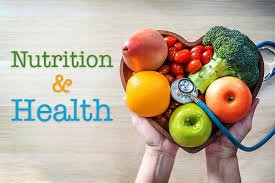Health and nutrition are closely related and form the basis of overall well-being
Health and Nutrition: A Vital Partnership for Well-Being Health and nutrition are closely related and form the basis of overall well-being. Proper nutrition energizes the body, supports its functions and prevents disease. At the same time, good health allows people to live active and vibrant lives.

Health and Nutrition
A Vital Partnership for Well-Being Health and nutrition are closely related and form the basis of overall well-being. Proper nutrition energizes the body, supports its functions and prevents disease. At the same time, good health allows people to live active and vibrant lives. In an age where processed foods and sedentary lifestyles are commonplace, understanding the relationship between health and nutrition is more important than ever. Nutrition Basics Nutrition is the process by which our bodies absorb and use the nutrients they need for growth, energy and maintenance.
The nutrients we get from food can be categorized into six categories:
- Carbohydrates: Carbohydrates are the body's main source of energy and are found in foods like grains, fruits, and vegetables. Complex carbohydrates like whole grains provide sustained energy and are rich in fiber, which aids digestion.
- Protein: Protein is essential for tissue repair, muscle building, and immune function and comes from both animal sources (meat, dairy, eggs) and plant sources (beans, nuts, seeds). Amino acids, the building blocks of protein, are crucial for overall health.
- Fats: Though often demonized, fats are essential for brain function, energy and vitamin absorption. Healthy fats, such as those found in olive oil, avocado and oily fish, support heart health, while trans and saturated fats should be kept to a minimum.
- Vitamins and Minerals: These micronutrients support a variety of bodily functions, including immune defense, bone health and blood clotting. Vitamins like A, C, and D, and minerals like calcium and iron play an important role in maintaining good health.
- Water: Often overlooked, water is essential for every function in the body, from regulating body temperature to digestion. Proper hydration supports everything from mental clarity to physical endurance. The role of a balanced diet A balanced diet ensures your body gets the right amounts of these nutrients.
Whole foods such as fruits, vegetables, lean proteins, whole grains, and healthy fats provide a wide range of nutrients needed for optimal health.
Energy and vitality: Proper nutrition energizes the body and mind and prevents fatigue and lethargy.
Immune function: A nutritious diet strengthens the immune system and helps the body fight infections.
Prevention of chronic disease: An improper diet has been linked to diseases such as diabetes, heart disease, and certain types of cancer. A healthy diet reduces the risk of these diseases.
Mental Health: Recent studies have revealed a relationship between diet and mental health. Nutrient-rich foods reduce symptoms of depression and anxiety, while poor eating habits can worsen these symptoms. Effects of Poor Nutrition A poor diet, characterized by a diet high in processed foods, sugar, and unhealthy fats and low in essential nutrients, has far-reaching effects on health. Excessive consumption of fast food, sugary drinks, and snacks can lead to nutritional deficiencies, obesity, and increased risk of chronic diseases.
Effects of a poor diet: Obesity: Eating too many energy-dense, nutrient-poor foods can lead to weight gain, which has been linked to conditions such as heart disease, type 2 diabetes, and joint problems. Nutrient deficiencies: Deficiencies in essential vitamins and minerals can lead to diseases such as anemia (from iron deficiency) and scurvy (from vitamin C deficiency) and weaken the body's defenses.
Digestive problems: A diet low in fiber and fluids can lead to constipation and other digestive problems.
Poor mental health: A diet high in sugar and processed foods can negatively affect mood and cognitive function. Nutrition throughout life Nutrient needs change throughout life, so it's important to adapt your diet to different stages.
Infancy and childhood: A nutrient-dense diet supports rapid growth and brain development. Adequate protein, fats, vitamins and minerals are important.
Adolescence: During this growth period, calcium, iron and protein are essential for bone development and increasing energy needs.
Adulthood: A balanced diet helps maintain energy levels, manage weight and prevent chronic disease. Foods rich in heart-healthy fats, lean proteins and fiber become even more important.
Aging: Older adults need fewer calories but more nutritious foods. Calcium, Vitamin D and protein are important for maintaining bone health and muscle mass. Make Healthier Choices Establishing healthy eating habits doesn't have to be that difficult.
Here are some practical tips to make nutrition a part of your daily life:
- Choose whole foods: Choose fresh fruits, vegetables, whole grains and lean proteins over processed alternatives.
- Limit Sugar and Salt: Reduce your intake of sugary snacks and drinks and limit your salt intake to maintain heart health.
- Stay Hydrated: Drink water throughout the day to support digestion, energy levels and overall function.
- Portion Control: Watch your portion sizes to avoid overeating, especially when consuming energy-dense foods.
- Plan your meals: When you prepare meals at home, you have control over ingredients and portion sizes, making it easier to eat healthy.
Health and nutrition are partners in maintaining a balanced, active life. By making conscious food choices, prioritizing whole foods, and paying attention to your body's changing needs, you can build a foundation for lifelong health. The power of proper nutrition to prevent chronic disease, improve mental clarity, support energy levels, and more cannot be overstated.
What's Your Reaction?




















![Canva Tutorial For Beginners | How to Use Canva Like PRO [FREE] | Canva Full Course](https://img.youtube.com/vi/yWJp7gQqCQ8/maxresdefault.jpg)
